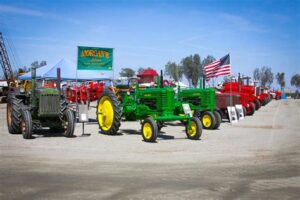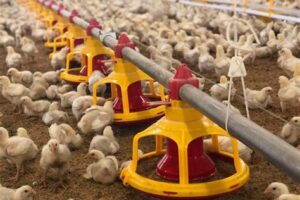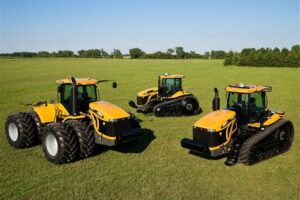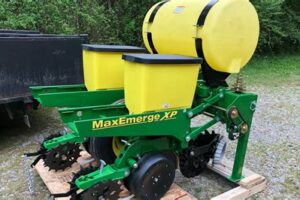Table of Contents
A Farm Equipment Mechanic is a skilled professional responsible for maintaining and repairing various types of agricultural machinery and equipment. They diagnose mechanical issues, perform routine maintenance, and ensure that farm equipment is in optimal working condition. A Farm Equipment Mechanic plays a crucial role in ensuring the smooth operation of farms and agricultural businesses.
As a farm owner or operator, you understand the importance of having reliable and efficient equipment to keep your operation running smoothly. However, when your tractors, harvesters, and other farm machinery break down, it can be a major setback that affects your productivity and profitability. This is where a skilled and experienced farm equipment mechanic comes in – a professional who can diagnose and repair any issues with your machinery, ensuring that you can get back to work as quickly as possible. With their expertise and attention to detail, they play a crucial role in keeping your farm running like a well-oiled machine.
Introduction
Being a farm equipment mechanic is a challenging and rewarding profession. These skilled individuals play a crucial role in keeping farm machinery running smoothly, ensuring that farmers can continue their operations efficiently. Farm equipment mechanics are responsible for repairing, maintaining, and inspecting various types of agricultural machinery, such as tractors, combines, sprayers, and harvesters. In this article, we will explore the essential skills, qualifications, and responsibilities required to excel in this field.
Education and Training
While a formal education is not always mandatory to become a farm equipment mechanic, it can greatly benefit individuals seeking a competitive edge in this industry. Many vocational schools, community colleges, and technical institutes offer programs specifically tailored to train aspiring farm equipment mechanics. These programs typically cover topics such as engine repair, hydraulic systems, electrical diagnostics, and welding techniques. Additionally, apprenticeships and on-the-job training opportunities provide hands-on experience and further enhance practical skills.
Technical Expertise
A farm equipment mechanic must possess a strong understanding of the various components that make up agricultural machinery. They should be proficient in diagnosing and troubleshooting mechanical, electrical, and hydraulic issues. From engines and transmissions to steering and braking systems, a deep knowledge of how these systems function is vital for efficient repairs. Furthermore, staying up-to-date with the latest advancements in technology and machinery is crucial to remain competitive in this field.
Problem-Solving Abilities
Farm equipment mechanics face diverse challenges on a daily basis. They must possess excellent problem-solving skills to identify the root causes of malfunctions and develop effective solutions. Whether it’s repairing a faulty engine or fixing a hydraulic leak, being able to think analytically and approach problems systematically is essential. The ability to work under pressure and make quick decisions while maintaining attention to detail is also crucial for a successful farm equipment mechanic.
Physical Stamina
The nature of the job often requires farm equipment mechanics to work in physically demanding environments. They may need to bend, lift heavy machinery parts, or crawl in tight spaces to access certain components. Having good physical stamina and dexterity enables them to perform tasks efficiently while minimizing the risk of injury. Additionally, being comfortable with working outdoors in various weather conditions is important as farm equipment repairs often take place in the field.
Excellent Communication Skills
A farm equipment mechanic frequently interacts with farmers, equipment operators, and other team members. It is crucial to possess strong communication skills to effectively understand and address their concerns. Clear and concise communication helps in explaining complex technical concepts to non-technical individuals, ensuring everyone involved is on the same page. Moreover, actively listening to clients’ descriptions of problems can help mechanics diagnose issues accurately and efficiently.
Attention to Detail
When working with intricate machinery, even the smallest oversight can have significant consequences. A farm equipment mechanic must pay meticulous attention to detail to avoid potential mistakes during repairs and maintenance. Thoroughly inspecting equipment, following service manuals precisely, and documenting all repairs are critical aspects of the job. This level of precision ensures that the machinery is safe to operate and minimizes the likelihood of future breakdowns.
Business and Customer Service Skills
Sometimes, farm equipment mechanics operate independently or run their own businesses. In these cases, having basic business skills is vital. Mechanics must be able to manage their finances, handle paperwork, and market their services effectively. Furthermore, providing excellent customer service is crucial to build long-term relationships with clients. Being responsive, professional, and reliable helps establish trust and a positive reputation within the agricultural community.
Adaptability and Flexibility
The agricultural industry is constantly evolving, with new technologies and machinery being introduced regularly. A successful farm equipment mechanic should be adaptable and willing to learn. They need to quickly grasp new concepts and techniques to stay ahead of the curve. Additionally, being flexible in terms of working hours is important as farmers often require urgent repairs during critical times, such as planting or harvesting seasons.
Commitment to Safety
Ensuring the safety of farmers and equipment operators is of utmost importance. A farm equipment mechanic should always prioritize safety when repairing or maintaining machinery. Adhering to proper safety protocols, using personal protective equipment, and conducting thorough inspections are essential practices. By promoting a culture of safety, mechanics help prevent accidents and contribute to a safer working environment for all involved.
Conclusion
Being a farm equipment mechanic requires a unique set of skills, technical expertise, and personal qualities. These professionals play a pivotal role in keeping agricultural operations running smoothly by maintaining and repairing essential machinery. With the right education, training, and dedication, farm equipment mechanics can enjoy a fulfilling career where they contribute to the success of farmers and the agricultural industry as a whole.
The Role of a Farm Equipment Mechanic
Farm equipment mechanics play a vital role in ensuring the proper functioning and safety of various farm machines and vehicles. They are responsible for thoroughly inspecting the equipment to identify any existing or potential issues that may hinder its functionality, efficiency, or pose risks to operators. This involves assessing the engine, electrical systems, hydraulics, transmissions, and other components to determine the necessary repairs or maintenance.
A key responsibility of a farm equipment mechanic is diagnosing and troubleshooting mechanical problems. By utilizing their expert knowledge and diagnostic tools, they can identify the root cause of equipment malfunction. This process involves conducting tests, analyzing data, and using their skills to pinpoint the specific issue, allowing for effective repairs and minimizing downtime for the farm operations.
Regular maintenance is crucial to prevent breakdowns and extend the lifespan of farm equipment. Farm equipment mechanics are responsible for scheduling and performing routine maintenance tasks such as oil changes, filter replacements, and lubrication, ensuring that machines operate at their optimal efficiency. Furthermore, they are skilled in executing complex repairs, such as engine overhauls or transmission rebuilds, to restore equipment functionality and minimize farm productivity interruptions.
Skills and Qualifications
Farm equipment mechanics require a deep understanding of mechanical and electrical systems commonly found in farm machines. They must be well-versed in troubleshooting techniques, diagnostics tools, and repair methods, enabling them to handle a wide range of equipment issues effectively. Keeping up with technological advancements and industry trends is also crucial for providing the highest level of service.
The ability to analyze complex problems, identify causes, and determine the best course of action is a critical skill for farm equipment mechanics. With a sharp eye for detail and logical reasoning abilities, they can efficiently diagnose and address equipment malfunctions. Their problem-solving skills enable them to find innovative solutions to minimize downtime and reduce costs for the farmers.
Farm equipment mechanics often work in teams or interact directly with farm owners or operators. Clear and concise communication skills are essential for effectively sharing information about equipment issues, repair processes, and maintenance recommendations. Additionally, documenting their work accurately and comprehensively helps to ensure accountability, track maintenance schedules, and provide valuable insights for future diagnostics and troubleshooting.
As a Farm Equipment Mechanic, it is crucial to maintain a professional voice and tone when discussing the role and importance of our profession. Here are some key points from my perspective:
Expertise: As a Farm Equipment Mechanic, we possess specialized knowledge and skills in repairing and maintaining various types of agricultural machinery, such as tractors, harvesters, and irrigation systems. Our expertise enables us to diagnose and troubleshoot complex issues efficiently.
Ensuring Efficiency: Our role is essential in ensuring that farm equipment operates at optimal levels of performance and efficiency. By conducting regular inspections, routine maintenance, and timely repairs, we help farmers avoid costly breakdowns during critical farming seasons.
Maximizing Productivity: By keeping farm equipment in excellent working condition, we contribute to maximizing productivity on the farm. Well-maintained machinery helps farmers complete tasks more quickly and effectively, allowing them to focus on other aspects of their operations.
Safety First: Farm equipment can be hazardous if not properly maintained. We play a crucial role in ensuring the safety of both farmers and farm workers by identifying potential risks or malfunctions and implementing necessary repairs and safety measures.
Adapting to Technological Advances: In today’s rapidly evolving agricultural industry, farm equipment is becoming increasingly sophisticated and technologically advanced. As Farm Equipment Mechanics, we must stay up-to-date with the latest technologies and innovations to effectively repair and maintain these advanced machines.
Problem Solvers: Our profession requires a high level of problem-solving skills. Farm equipment can encounter various issues, and it is our responsibility to diagnose the problem accurately and find effective solutions. This requires a deep understanding of mechanics, electrical systems, and hydraulics.
Customer Service: We also play a vital role in providing excellent customer service to farmers. Our ability to communicate technical information effectively, provide guidance on equipment usage and maintenance, and offer prompt assistance when needed helps build trust and long-term relationships with our clients.
In conclusion, as Farm Equipment Mechanics, we bring expertise, efficiency, safety, and problem-solving skills to the agricultural industry. By maintaining professionalism and a customer-oriented approach, we contribute to the success and productivity of farmers while ensuring the smooth operation of farm equipment.
Thank you for visiting our blog and taking the time to learn about the vital role of a Farm Equipment Mechanic. As professionals in the field, we understand the importance of keeping agricultural machinery in top working condition to ensure the smooth operation of farms and the productivity of farmers. The work of a Farm Equipment Mechanic requires both technical expertise and a deep understanding of the unique challenges faced in the agricultural industry.
First and foremost, a Farm Equipment Mechanic is responsible for diagnosing and repairing various types of machinery used in farming operations. This includes tractors, combines, harvesters, and other specialized equipment. With their extensive knowledge of engines, hydraulic systems, electrical components, and more, these skilled professionals can quickly identify any issues and implement effective solutions.
Moreover, a Farm Equipment Mechanic plays a critical role in preventative maintenance. By regularly inspecting and servicing equipment, they can identify potential problems before they become major breakdowns. This proactive approach not only saves farmers valuable time and money but also minimizes downtime during crucial periods such as planting and harvesting seasons.
In addition to their technical skills, Farm Equipment Mechanics possess excellent problem-solving abilities. They are often required to think on their feet and come up with innovative solutions, especially when faced with complex or unforeseen issues. Their ability to troubleshoot and resolve problems efficiently is essential to keep farm machinery running smoothly and to minimize disruptions in daily operations.
In conclusion, the role of a Farm Equipment Mechanic is indispensable in the agricultural industry. These professionals possess the technical expertise, industry knowledge, and problem-solving abilities necessary to keep farming machinery in optimal condition. By ensuring the reliability and efficiency of equipment, they contribute significantly to the success and productivity of farms and farmers alike. We hope this article has shed light on the crucial work of Farm Equipment Mechanics and the importance of their role in agriculture.
Thank you once again for visiting our blog, and we encourage you to explore more of our articles to gain further insights into the world of farming and agricultural practices.
Video Farm Equipment Mechanic
People also ask about Farm Equipment Mechanic:
What does a farm equipment mechanic do?
A farm equipment mechanic is responsible for inspecting, repairing, and maintaining various types of agricultural machinery and equipment. They troubleshoot and diagnose mechanical issues, perform routine maintenance tasks, and ensure that all machinery is in proper working condition to maximize productivity on the farm.
What skills are required to be a farm equipment mechanic?
To excel as a farm equipment mechanic, one should have strong technical knowledge related to engines, hydraulics, electrical systems, and other mechanical components commonly found in farm machinery. Problem-solving, troubleshooting, and diagnostic skills are essential for identifying and rectifying issues efficiently. Additionally, good communication skills and the ability to work independently or as part of a team are valuable in this profession.
What qualifications are needed to become a farm equipment mechanic?
While formal education requirements may vary, most farm equipment mechanics acquire their skills through a combination of vocational training programs and hands-on experience. Completing a relevant certificate or associate degree program in diesel technology, agricultural mechanics, or a related field can provide a solid foundation. Some employers may also prefer candidates with a valid driver’s license and industry certifications.
How much does a farm equipment mechanic earn?
The salary of a farm equipment mechanic can vary depending on factors such as experience, location, and the size of the farm or organization. On average, farm equipment mechanics earn a median annual wage of around $48,000 in the United States. However, highly skilled and experienced individuals can earn significantly more.
What are the career prospects for farm equipment mechanics?
The demand for farm equipment mechanics is expected to remain stable in the coming years. As long as agriculture continues to be an important industry, there will be a need for skilled professionals to maintain and repair farming machinery and equipment. With additional experience and training, farm equipment mechanics can advance their careers by taking on supervisory roles or specializing in specific types of agricultural machinery.
Remember to consult with industry professionals or official sources to gather the most accurate and up-to-date information about being a farm equipment mechanic.






